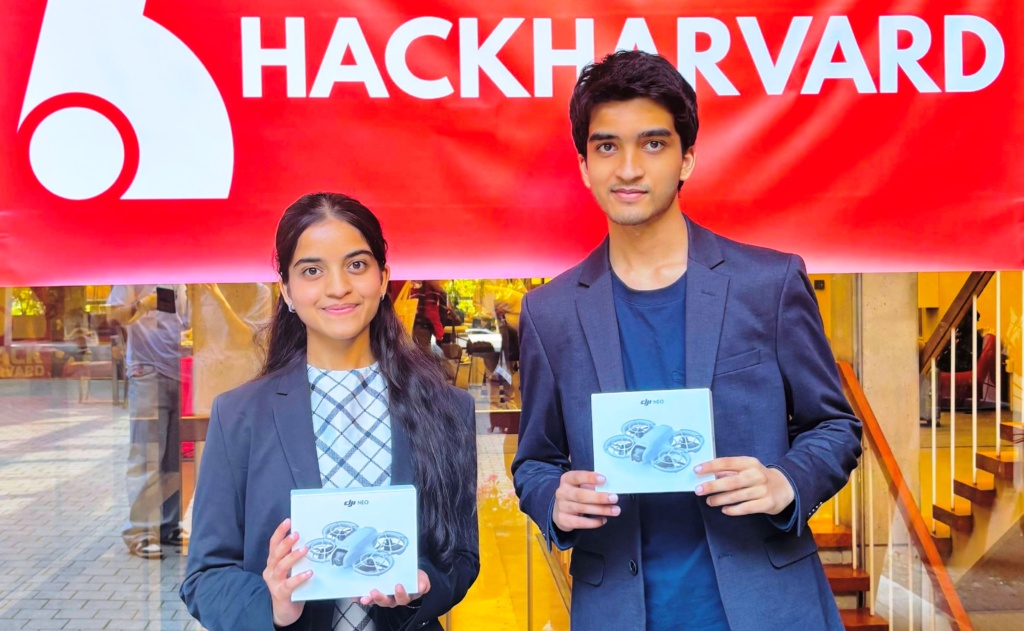
Indian-origin twins, Harpita and Harpith Pandian, students at Rutgers University, Honors College, have won First Place in the Infosys Human Augmentation Track at HackHarvard 2025, a global hackathon organized by Harvard University. Their winning innovation, Halo, is an iOS app that uses Artificial Intelligence (AI) and Augmented Reality (AR) to guide ordinary people to respond like trained professionals during real-life medical emergencies.
Inspired by a deeply personal incident when their mother, a Type 1 diabetic, suffered a near-fatal diabetic ketoacidosis (DKA) episode the twins were motivated to ensure that no one feels helpless in a medical crisis. Halo blends Voice AI and Spatial AR overlays to give step-by-step visual and verbal guidance during critical moments such as performing CPR, managing diabetic emergencies, or assisting in accidents. The app acts as a virtual emergency coach, helping bystanders bridge the gap before medical professionals arrive.
The twins envision Halo being used in schools, colleges, and workplaces for emergency preparedness and health education. Beyond crises, its underlying technology could support rehabilitation, physical therapy, and personal wellness, transforming the Halo agent into a trusted digital health companion.
Their academic foundation in Computer Science, AI, and Cognitive Science at Rutgers helped them combine empathy with innovation building intelligent systems that amplify human judgment and action.
The Pandian twins built Halo in just 36 hours during HackHarvard, mastering new AR Kit components and Swift integration under intense deadlines. Their achievement marks yet another milestone in a stellar hackathon journey that includes wins at major hackathons, including HackPrinceton 2025 (Princeton University), HackMIT 2025 (Massachusetts Institute of Technology), and PennApps 2025 (University of Pennsylvania).
Harpita Pandian said,“Innovation isn’t just about building technology; it’s about building confidence and compassion in people. Storytelling is as important as code because innovation is only powerful when you can communicate it clearly. Our dream is to bring projects like Halo back home empowering students, schools, and communities in India to use emerging tech for real-world impact. We’re proud of our roots and truly believe in India’s youth tech talent. ”
Harpith Pandian Said, “Those first five minutes made the difference. We wanted to make sure anyone, anywhere, could act quickly and confidently when it matters most. Every minute counts in cardiac arrest, CPR started by a bystander can double survival rates, but most people freeze because they don’t know what to do. Halo changes that. Every hackathon is a sandbox for learning don’t chase prizes, chase progress. Each project should teach you something new. We hope more Indian students step forward to explore AI and human-augmentation technologies, because innovation born from empathy can truly change lives.”
About Harpita Pandian & Harpith Pandian
Harpita Pandian and Harpith Pandian are Indian-origin twin innovators born in Chennai, Tamil Nadu, and currently pursuing their Bachelor’s degrees in Computer Science, Artificial Intelligence, and Cognitive Science at Rutgers University, New Brunswick, USA.
Harpith and Harpita are fondly known as the Great Australian Spelling Bee Twins, and lived in Australia until the age of 8. After returning to India in 2016, they soon founded an EdTech company Classminds, which impacted thousands of students across India and the world. Their early exposure to India’s dynamic learning culture shaped their passion for human-centered AI, voice agents, and neuro-inspired technologies that blend science with social impact.
Even while studying abroad, the twins continue to engage with their roots in India mentoring students through online innovation bootcamps, contributing to open-source AI projects, and collaborating with Indian NGOs focused on STEM education and healthcare access. They are strong advocates for youth participation in global innovation platforms, encouraging Indian students to embrace opportunities like Hackathons and AI research challenges.The Pandian twins envision a future where technology built by young minds in India can redefine healthcare accessibility, safety education, and emergency preparedness worldwide. Their journey stands as a testament to how curiosity, compassion, and cultural connection can together create impactful innovation.
